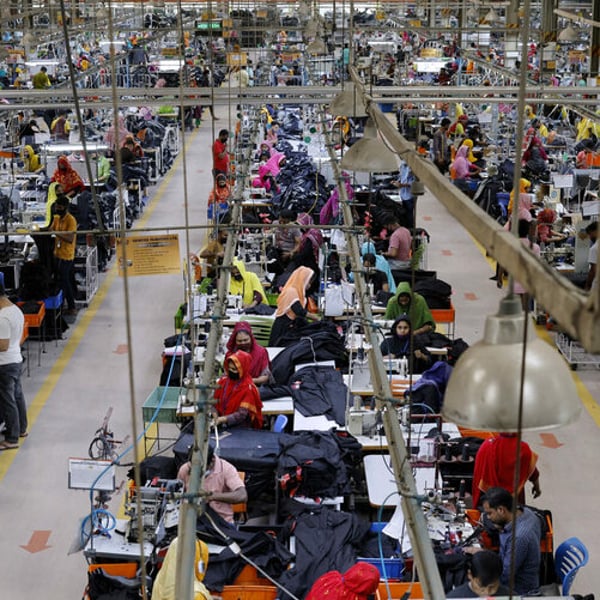By
Bloomberg
Published
March 30, 2025
Simon Wolfson, chief executive officer of Next Plc, on Thursday announced pretax profit of £1 billion ($1.3 billion) for the first time in the retailer’s history. It’s a level of earnings few British store chains reach. For some that have, it has been the prelude to a period of disappointment. But Next can escape the curse of the £1 billion profit retailer.

Next’s biggest rival Marks & Spencer Group Plc is perhaps best known for suffering from this affliction. The high street stalwart hit the magic number in 1997 and 1998, when it was enjoying a surge in fashion sales, which then accounted for the bulk of its revenue and was very profitable. But to reach that target, M&S invested more in its bodysuits and blazers than in equally stylish stores. Customers eventually noticed. By 1999, after a damaging succession battle, profit had halved.
M&S topped £1 billion of pretax profit again in 2008, after coming close in 2007, when then CEO Stuart Rose once more revived its fashion, with eye-catching advertising led by 1960s fashion icon Twiggy. By then, food had become a much bigger part of the business, accounting for about 50% of sales. Brits were snapping up its indulgent treats, thanks in part to its “This is not just food….” campaign. But the milestone coincided with the global financial crisis, and profit went backwards once more.
It’s hard to see Next suffering from similar self-inflicted wounds. Wolfson is unlikely to sacrifice future investment in order to maintain the £1 billion level or become more profligate in his spending.
“If a business carries on growing its profits, it’s going to have to pass that threshold at some point,” he told me. “Nobody’s pension is paid by companies achieving an absolute level of profit.” What mattered to investors instead, he added, was the annual expansion in earnings per share, which had increased to 636 pence from 22 pence over the last 30 years.
The Next CEO also warned against thinking that a business of its size could shoulder excessive regulation and taxation. Although it upgraded its forecast for profit in the year to January 2026 by £20 million to £1.07 billion, sending the shares up as much as 11%, Wolfson said that tax increases next month could hurt employment and consumer confidence.
Next can’t escape the broader consumer backdrop. But it does have some levers to pull.
A key part of the company’s resilience has come from building its historic postal catalogue into a muscular online business, which accounts for over 50% of UK sales. Wolfson is now looking to replicate this success internationally. Expanding overseas has been distracting for some British retailers — including M&S — but Next will avoid opening its own stores outside of the UK. Instead it’s selling online in markets close to home either through its own website or other platforms, such as Zalando SE, with which it will work more closely. Further afield, it will sell Next products through retailers such as US department store chain Nordstrom Inc.
Then there are opportunities with brands outside of core Next, such as Label, which sells third-party names. This includes Seasons, which offers fashion from designers such as Joseph, Ganni and Rixo, to meet a desire among customers to buy fewer, better-quality items.
Online luxury has been decimated by the collapse of Matches Fashion and the struggles of Farfetch Ltd. over the past 18 months. That creates opportunities for players like Next that have the warehouse and logistical capabilities to serve more premium customers. Another way to enhance returns is to offer these services to the third-party brands it sells.
“We have lots and lots of acorns,” Wolfson noted. “We don’t tend to talk about them until they are at least saplings.”
Perhaps the biggest risk for Next is not reaching £1 billion of profit, but the day Wolfson decides to hang up his shopkeeper’s apron.
Under his tenure, which began in 2001, shares have generated a total return, including reinvested dividends, of 2,900%, about 13 times that of the FTSE 100 Index. The company is highly cash generative, having a surplus of £669 million last year, enabling it to invest and return money to shareholders, including through £360 million of share buy-backs.
“I’m 57 years old, relatively young as a CEO. My plans are completely unchanged by the fact we have now reached this slightly arbitrary [number]” he said.
Given his diligent management of the business, he’s likely to have built a strong team behind him, even if he remains so closely associated with the company. But CEO succession is an issue that investors will eventually have to contend with.
Next can be the exception to the rule that £1 billion of profit is a harbinger of doom for Britain Plc. It must now take steps to ensure that when the time comes, it departs from another uncomfortable chapter in the retail history books: When a long-serving and successful leader bows out, a period in the wilderness follows.




